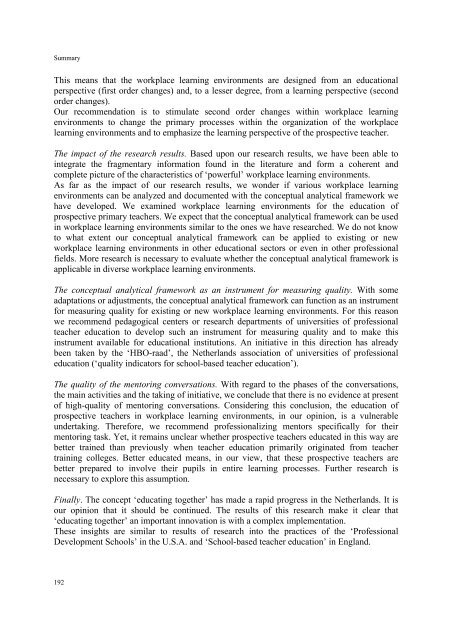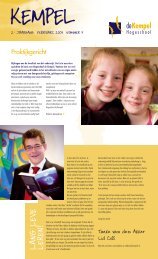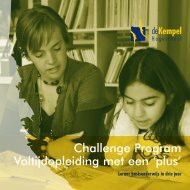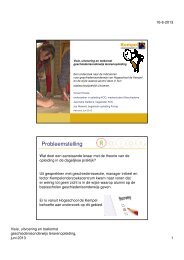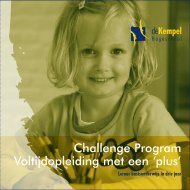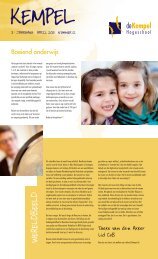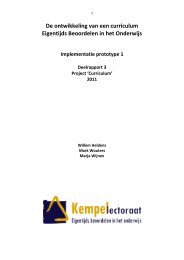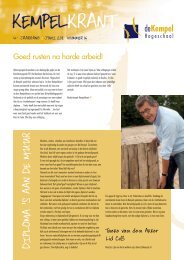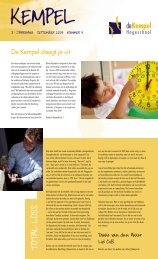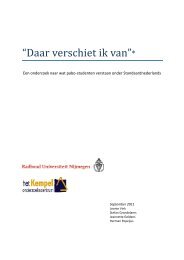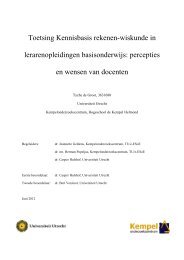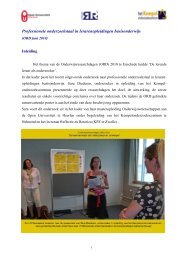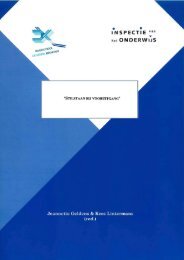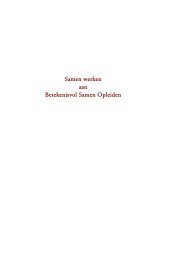leren onderwijzen in een werkplekleeromgeving - Hogeschool de ...
leren onderwijzen in een werkplekleeromgeving - Hogeschool de ...
leren onderwijzen in een werkplekleeromgeving - Hogeschool de ...
Create successful ePaper yourself
Turn your PDF publications into a flip-book with our unique Google optimized e-Paper software.
Summary<br />
This means that the workplace learn<strong>in</strong>g environments are <strong>de</strong>signed from an educational<br />
perspective (first or<strong>de</strong>r changes) and, to a lesser <strong>de</strong>gree, from a learn<strong>in</strong>g perspective (second<br />
or<strong>de</strong>r changes).<br />
Our recommendation is to stimulate second or<strong>de</strong>r changes with<strong>in</strong> workplace learn<strong>in</strong>g<br />
environments to change the primary processes with<strong>in</strong> the organization of the workplace<br />
learn<strong>in</strong>g environments and to emphasize the learn<strong>in</strong>g perspective of the prospective teacher.<br />
The impact of the research results. Based upon our research results, we have b<strong>een</strong> able to<br />
<strong>in</strong>tegrate the fragmentary <strong>in</strong>formation found <strong>in</strong> the literature and form a coherent and<br />
complete picture of the characteristics of ‘powerful’ workplace learn<strong>in</strong>g environments.<br />
As far as the impact of our research results, we won<strong>de</strong>r if various workplace learn<strong>in</strong>g<br />
environments can be analyzed and documented with the conceptual analytical framework we<br />
have <strong>de</strong>veloped. We exam<strong>in</strong>ed workplace learn<strong>in</strong>g environments for the education of<br />
prospective primary teachers. We expect that the conceptual analytical framework can be used<br />
<strong>in</strong> workplace learn<strong>in</strong>g environments similar to the ones we have researched. We do not know<br />
to what extent our conceptual analytical framework can be applied to exist<strong>in</strong>g or new<br />
workplace learn<strong>in</strong>g environments <strong>in</strong> other educational sectors or even <strong>in</strong> other professional<br />
fields. More research is necessary to evaluate whether the conceptual analytical framework is<br />
applicable <strong>in</strong> diverse workplace learn<strong>in</strong>g environments.<br />
The conceptual analytical framework as an <strong>in</strong>strument for measur<strong>in</strong>g quality. With some<br />
adaptations or adjustments, the conceptual analytical framework can function as an <strong>in</strong>strument<br />
for measur<strong>in</strong>g quality for exist<strong>in</strong>g or new workplace learn<strong>in</strong>g environments. For this reason<br />
we recommend pedagogical centers or research <strong>de</strong>partments of universities of professional<br />
teacher education to <strong>de</strong>velop such an <strong>in</strong>strument for measur<strong>in</strong>g quality and to make this<br />
<strong>in</strong>strument available for educational <strong>in</strong>stitutions. An <strong>in</strong>itiative <strong>in</strong> this direction has already<br />
b<strong>een</strong> taken by the ‘HBO-raad’, the Netherlands association of universities of professional<br />
education (‘quality <strong>in</strong>dicators for school-based teacher education’).<br />
The quality of the mentor<strong>in</strong>g conversations. With regard to the phases of the conversations,<br />
the ma<strong>in</strong> activities and the tak<strong>in</strong>g of <strong>in</strong>itiative, we conclu<strong>de</strong> that there is no evi<strong>de</strong>nce at present<br />
of high-quality of mentor<strong>in</strong>g conversations. Consi<strong>de</strong>r<strong>in</strong>g this conclusion, the education of<br />
prospective teachers <strong>in</strong> workplace learn<strong>in</strong>g environments, <strong>in</strong> our op<strong>in</strong>ion, is a vulnerable<br />
un<strong>de</strong>rtak<strong>in</strong>g. Therefore, we recommend professionaliz<strong>in</strong>g mentors specifically for their<br />
mentor<strong>in</strong>g task. Yet, it rema<strong>in</strong>s unclear whether prospective teachers educated <strong>in</strong> this way are<br />
better tra<strong>in</strong>ed than previously when teacher education primarily orig<strong>in</strong>ated from teacher<br />
tra<strong>in</strong><strong>in</strong>g colleges. Better educated means, <strong>in</strong> our view, that these prospective teachers are<br />
better prepared to <strong>in</strong>volve their pupils <strong>in</strong> entire learn<strong>in</strong>g processes. Further research is<br />
necessary to explore this assumption.<br />
F<strong>in</strong>ally. The concept ‘educat<strong>in</strong>g together’ has ma<strong>de</strong> a rapid progress <strong>in</strong> the Netherlands. It is<br />
our op<strong>in</strong>ion that it should be cont<strong>in</strong>ued. The results of this research make it clear that<br />
‘educat<strong>in</strong>g together’ an important <strong>in</strong>novation is with a complex implementation.<br />
These <strong>in</strong>sights are similar to results of research <strong>in</strong>to the practices of the ‘Professional<br />
Development Schools’ <strong>in</strong> the U.S.A. and ‘School-based teacher education’ <strong>in</strong> England.<br />
192


